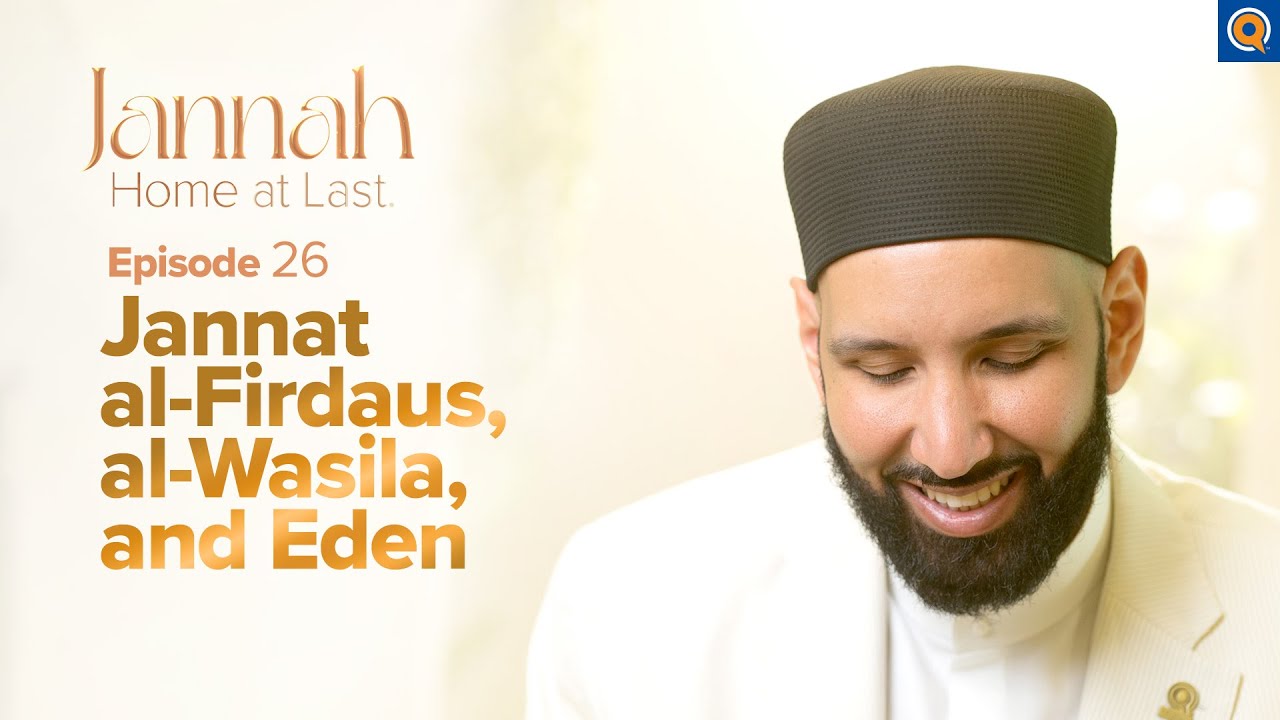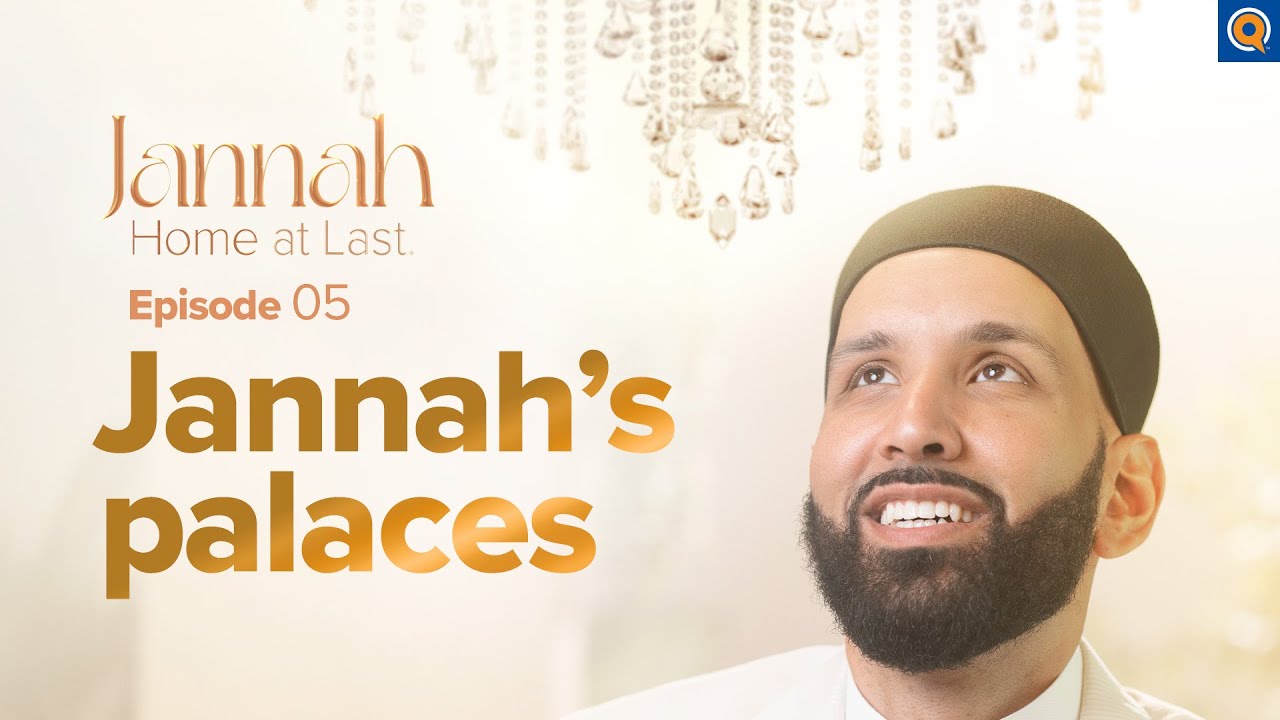Your Family in Jannah | Ep. 14 | #JannahSeries with Dr. Omar Suleiman
Summary
TLDRThis video emphasizes the significance of family in achieving Jannah (Paradise). It highlights the importance of treating family well, as Jannah would not be complete without them. The speaker discusses how Allah unites families in Jannah, even those with differing levels of righteousness. The video covers the roles of parents, spouses, children, and ancestors, explaining how Allah's mercy allows reunions and joy in Jannah. It also touches on the absence of worldly emotions like jealousy and the joy of being reunited with lost loved ones in the afterlife.
Takeaways
- 👨👩👧👦 Family is central to celebration in life and in Jannah (paradise), as the ultimate joy is to be reunited with them there.
- 🌿 Jannah (paradise) is described as a place where families will be reunited, including ancestors who acted righteously.
- 👩🦳 The Prophet Muhammad (SallAllahu 'Alaihi Wasallam) emphasized the importance of honoring one's mother, as paradise lies beneath her feet.
- 👨👦 The father holds a significant role too, as the middle gate of Jannah, and treating him with respect is crucial to entering paradise.
- 🌠 Allah's mercy extends to raising offspring or ancestors to higher levels in Jannah if they were righteous but of lesser deeds, uniting families in joy.
- ❤️ In Jannah, even spouses will be together, with no remnants of worldly troubles or fights; everyone will be in harmony and love.
- 🌟 No one will feel sadness in Jannah, and Allah ensures that all believers, including spouses, are satisfied with their companionship.
- 👶 For parents who lost children in this world, Jannah promises a reunion where their children will be returned to them, and they will grow up in paradise.
- 🕊️ Children of believers who passed away will be cared for in Jannah by prophets until they are reunited with their parents on the Day of Judgment.
- 🎂 In Jannah, all believers will be brought to a perfect age (33 years old), including those who passed away as children, bringing comfort and joy to their parents.
Q & A
What is the central theme of the script?
-The central theme of the script is the importance of family in both this life and the afterlife, particularly in relation to entering Jannah (paradise) together as a family unit. It emphasizes the significance of family ties, treating family members well, and the hope of being reunited with righteous family members in Jannah.
How does the script emphasize the importance of treating one's parents well?
-The script emphasizes the importance of treating parents well by referencing two sayings of the Prophet Muhammad (SallAllahu 'Alaihi Wasallam): 'Paradise is beneath your mother’s feet,' and 'Your father is the middle gate of Jannah.' This highlights that respect, care, and obedience toward parents are key to entering Jannah.
What does the script say about the concept of family reunion in Jannah?
-The script explains that family members will be reunited in Jannah, even if they were at different levels of righteousness. Allah, in His mercy, will raise the status of less righteous family members to match the highest-ranking ones in Jannah, bringing joy to the hearts of His servants.
What role do ancestors play in the concept of family reunion in Jannah?
-The script mentions that Allah's mercy extends beyond just immediate family members to include ancestors like grandparents and even great-grandparents. Righteous believers may be reunited with their ancestors in Jannah, including notable figures from Islamic history.
What does the script say about spouses in Jannah?
-The script explains that everyone will have companionship in Jannah, as the Prophet Muhammad (SallAllahu 'Alaihi Wasallam) said, 'No one is single in Jannah.' Whether or not one had a spouse in this life, they will be paired in Jannah, and any conflicts from worldly relationships will be forgotten, replaced by joy and harmony.
How does the script address the question of children who pass away before their parents?
-The script shares a comforting message for parents who have lost children, stating that these children will be cared for in Jannah by Prophet Ibrahim (Alayhis Salaam) and will reunite with their parents on the Day of Judgment. The children wait for their parents at the gates of Jannah, refusing to enter until their parents join them.
What age will everyone be in Jannah according to the script?
-According to the script, once everyone enters Jannah, they will all be 33 years old, regardless of their age at the time of death. This includes children who passed away at a young age; they will grow up and reach the age of 33 in Jannah.
What does the script say about a woman's marriage if she had multiple husbands in her life?
-The script mentions different scholarly views on this matter. One view is that a woman would be with her last husband, while another suggests she could choose the husband she wishes to be with in Jannah. Regardless, she will be pleased, and there will be no jealousy or sadness.
How does the script address the absence of sadness or jealousy in Jannah?
-The script emphasizes that there is no sadness, jealousy, or grudges in Jannah. It explains that even if one is unable to intercede for a family member who did not make it to Jannah, Allah will ensure that no one feels disappointment or sorrow.
What does the script highlight about Allah’s mercy in relation to family and Jannah?
-The script highlights that Allah's mercy is vast and generous. Allah will elevate the ranks of family members in Jannah to ensure that they can be together, and no one's rewards will be diminished. This reflects Allah's desire to bring joy to His righteous servants by allowing them to reunite with their loved ones.
Outlines

هذا القسم متوفر فقط للمشتركين. يرجى الترقية للوصول إلى هذه الميزة.
قم بالترقية الآنMindmap

هذا القسم متوفر فقط للمشتركين. يرجى الترقية للوصول إلى هذه الميزة.
قم بالترقية الآنKeywords

هذا القسم متوفر فقط للمشتركين. يرجى الترقية للوصول إلى هذه الميزة.
قم بالترقية الآنHighlights

هذا القسم متوفر فقط للمشتركين. يرجى الترقية للوصول إلى هذه الميزة.
قم بالترقية الآنTranscripts

هذا القسم متوفر فقط للمشتركين. يرجى الترقية للوصول إلى هذه الميزة.
قم بالترقية الآنتصفح المزيد من مقاطع الفيديو ذات الصلة

Gasht Me Mutakallim Kaise Baat Karen | Part 2 | Dawat Jannat Ka Rasta

Jannah | How Life Would Be In The Heaven?

Allah's Sign Just for You, A Special Gift Awaits!

Maidens of Paradise

Al-Firdaus: The Highest Level of Jannah | Ep. 26 | #JannahSeries with Dr. Omar Suleiman

Your Home in Jannah | Ep. 5 | #JannahSeries with Dr. Omar Suleiman
5.0 / 5 (0 votes)
